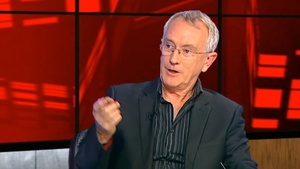


 Last night’s Tonight with Vincent Browne with economists Steve Keen and Constantin Gurdgiev and journalists Laura Noonan, Irish Independent banking correspondent, and Dan O’Brien. Irish Times Economics Editor.
Last night’s Tonight with Vincent Browne with economists Steve Keen and Constantin Gurdgiev and journalists Laura Noonan, Irish Independent banking correspondent, and Dan O’Brien. Irish Times Economics Editor.
We join the debate as the panel discuss the topical subject of debt relief and moral hazard.
Mind-altering confusion ensues.
Vincent Browne: “If you’re cutting household debt, it means that the
banks take a further hit.”
Laura Noonan: “It means that the banks take a hit and there’s also a real problem. There’s a real fairness argument to that because you hear all the time people, say who are on social welfare, who never borrowed for their houses they will ultimately end up getting lower social welfare payments because the taxpayer is paying the bank to take a hit.”
Constantin Gurdgiev: “That’s nonsense. Hold on a second, Laura. That is pure nonsense because what you’re assuming is that the taxpayer in this scheme will be recapitalising the banks and…”
Noonan: “The taxpayer owns the banks.”
Gurdgiev: “This is. Hold on a second. That is. You are.”
Noonan: “And has guaranteed the banks’ debts.”
[They talk over each other]
Gurdgiev: “There is no possibility of arguing with you because you simply take the position and then defend the position from the point of view of utterly irrational arguments. It’s not about fear, yes? Or about fairness yes? You have too much debts on the banks’ balance sheets, which are belonging to the households. If you don’t right those debts, there will be no social welfare because there will be nobody to pay the social welfare rates for social welfare recipients. One. Second one is, as I said, the co-operative solution will involve the ECB taking a hit, not the taxpayer. The ECB hit on the Irish banks of say €50 billion, roughly speaking yes? Peter Mathews talks about €75 billion. Say €50 billion will not make a blip of inflation repression even, let alone any sort of hit on the taxpayer.”
Noonan: “It still won’t happen.”
Gurdgiev: “Now that is a different argument Laura. This is not an argument from the fear, this is an argument from feasibility.”
Noonan: “I wasn’t talking about fear, I was talking about fairness and I think that fairness is important. You have people who didn’t borrow to buy houses, who’ll end up owning no houses.”
Steve Keen: “The fairness issue stops us realising the fundamental point that you (Gurdiev) were making, which is there was too much debt issued by irresponsible financial sector and Michael Hudson puts the phrase very simply ‘Debts that can’t be repaid won’t be repaid. All you have to work out is how you’re not going to repay them’.
Noonan: “But…”
Keen: “Now with that framework you have the other issue that there are people who got into debt and if you let them off that debt the get away with it. Whereas people who didn’t get into debt are penalised. So you have got that fairness issue. So you have to find a way of acknowledging that debts that can’t be repaid won’t be repaid, whilst still coping with the fairness. And the proposal I’d put forward on that is what I call a Modern Debt Jubilee but you could also call it quantitative easing for the public and that is to say that the Government sector or the banking sector, the Central Bank issues money – not to the banking sector – but to people.”
Gurdgiev: “Yeah.”
Keen: “And says ‘if you’re in debt you must, no choice, you must reduce your debt but if you’re not in debt, you get a cash injection. And that means that if you’re a saver, you’re not penalised, if you’re a borrower, your debt reduces. And the only sector of society that suffers – inverted commas – is the financial sector which has its money earning asset loans reduced, its cash levels go up so things don’t change. It still remains solvent technically. But it’s liquidity falls and it should fall because the finance sector is far too big.”
Browne: “Laura what do you make of that?”
Noonan: “I’m wondering where all the free money comes from? I fundamentally wonder where all the free money comes from?”
Browne: “It’s printed.”
Gurdgiev: it is printed. This is the function actually of the Central Bank.”
Keen: The Central Bank, created in Dublin. It’s what it has been doing.
[All talk over each other]
Dan O’Brien: ‘So there is an easy way out. What’s the downside of this?”
Keen: “The downside is that when you’re going to do that you’re going to expose the extent to which the productive side of our economy is being hollowed out by Ponzi schemes.”
Noonan: “You’d have a mad amount of inflation if you did that in Ireland?”
Keen: “You wouldn’t.”
Noonan: “If everyone was given €600,000…”
[They talk over each other]
Keen: “You are not changing the amount of money in the economy. All you’re doing is changing the backing of the money from being debt-based money to being Government-based money.”
Noonan: “OK, maybe I’m misunderstanding you. Can I just go through…Steve, Steve, Steve.. Can I just go through…”
Browne: “Let Laura, OK…”
Noonan: “Can I just go through a literal example of how this works. I’m a person and I have a mortgage for say €300,000, which I can’t pay back. The Government gives me €300,000, with which to pay it back.”
Keen: “Let’s say €200,000, you’re still in debt a bit.”
Noonan: “OK. €200,000. And the Government gives me €200,000 to pay it back. Dan has been saving. The Government also gives Dan €200,000.”
Keen: “Which say he goes from €100,000 to €300,000.”
Noonan: “Now how can we have all the other Dans who get their €200,000 in cash going out a on mad shopping spree which is going to deliver a lot of inflation.”
Keen: “What you’ve got at the moment actually is a problem of lack of aggregate demand…”
Gurdgiev: “Laura, you’re fundamentally missing the point OK.”
Noonan: “OK, can we answer that question Constantin before we move onto the other?”
Gurdgiev: “Here’s an answer for you. There is only a certain way you can walk out of the corner. Yes, would you agree with that? The only way you can walk out of the debt overhang is either by a vast amount of devaluation or by a vast amount of inflation which is one of the same by the way, OK? That is very simple. So you’re going to either have to inflate the economy or you have to devalue the currency. That’s very simple. Now we go back to the issue that Steve started with and it’s the European Governance and it’s the new Maastricht Treaty and the likes and the Eurozone itself and we are back into ‘how do you resolve the problem when you have the constraint of effectively the Central Bank which doesn’t do its job, which cannot do its job?’ Its job is to print money.”
O’Brien: “OK, can you give me an example of another country where this has happened?”
Keen: “Apparently Germany in 1945. A large part of the recovery of Germany after the Second World War was abolishing the debts and monetising the government…”
Noonan: “And they gave the people who didn’t have debts free money? They gave cash settlements to those who didn’t have debts?”
O’Brien: “You said apparently?”
Keen: “I’m an academic. If I say something it’s because I’ve researched it. If I say apparently it’s because I’ve read someone else has researched it.”
Dan O’Brien: “You’re making a very radical proposal and without any past example you’ve…”
Browne: “Hang on a minute folks, TV3 will need quantitative easing if we don’t go to an ad break…”
Watch here




